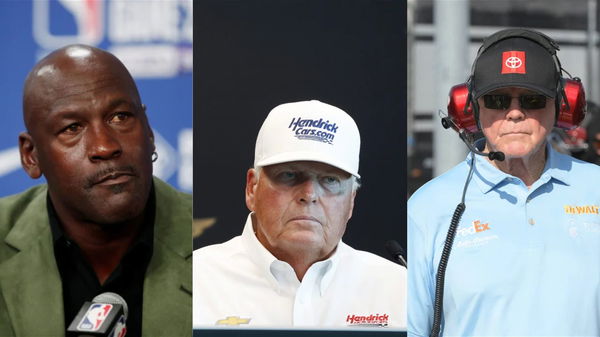
via Imago
[Hendrick] [Gibbs] [Jordan]

via Imago
[Hendrick] [Gibbs] [Jordan]
With the sport heading toward the impending end of the current charter deal at the end of this season, NASCAR has once again thrown a curveball at the teams. Only days after Stewart-Haas Racing announced they were shutting shop to let out four charters, the CEO of NASCAR has reportedly told teams that the governing body “can’t offer permanent charters,” according to a Twitter update by Adam Stern.
Stern’s tweet is linked to an article by ESPN’s Ryan McGee where Jim France emphasized the refusal for calls of a permanent charter, citing, “We can only support you (teams) as long as we are being supported.” These developments come to light after the 7.7-billion-dollar media rights deal signed by NASCAR in November, with teams campaigning for a fairer share of the incoming economic pie.
ADVERTISEMENT
Article continues below this ad
Teams unhappy with latest NASCAR charter offer
Sponsorship has been stingy recently, and trends suggest that interest of brands, in the sport, has been declining. One of the reasons why SRH may have decided to shutter is the loss of sponsors. At the end of the 2023 season, the team saw the departure of Busch Light, Gearwrench, Go Bowling, Hunt Brothers Pizza and other sponsors, leaving them struggling.
Meanwhile, NASCAR has been pulling out all the stops to present a more exciting product for fans worldwide. Consequently, this time, a better and more lucrative charter deal was demanded by teams, especially the ones struggling to retain money without much guarantee of their future for a set period. After all, not everyone can receive the strategic genius and resources available to bigger organizations belonging to names such as Rick Hendrick or Joe Gibbs.
Jim France has reportedly told teams that @NASCAR can't offer permanent charters because, "We can only support you as long as we are being supported [by media networks]." – @ESPN https://t.co/XcYZbQcBgf
— Adam Stern (@A_S12) June 10, 2024
But multiple team owners told The Associated Press that NASCAR’s most recent proposal, which came two weeks ago, was one of the worst offers yet. Apart from guaranteeing charters for only seven years ,with an option for another seven years following that, it also includes a cost cap and the France family being allowed to buy charters.
The offer also means, none of the demands of the teams have been met. Making the charters permanent, receiving 45% of traditional media revenue, receiving 33% of new revenue and a guaranteed seat at the table to give teams some governance power, is what the teams want. But NASCAR isn’t budging.
In case, the two parties can’t reach an agreement, precedent shows there is a chance the teams will boycott races. In 1969, Richard Petty and other drivers refused to race at Talladega due to the issues over tire durability. Then-NASCAR chairman Bill France Sr. put the race on anyway and worked to find other drivers to fill the field. Will Jim France be forced to do something similar, in case NASCAR teams remain formidable on their demands.
Newer heavy-hitters like 23XI Racing or Spire Motorsports have been loud in asking for a permanent spot on the table (so they won’t have to empty their pockets by renewing their charters). These revelations shed a concerning light on all perceived advancements in the negotiation process. For starters, Michael Jordan (co-owner of 23XI) expressed earlier in the spring how NASCAR might ‘die’ if the governing body keeps imposing these 7-year-long charter restrictions, with inflation not helping the teams either.
When Spire bought their first charter from Furniture Row Racing in 2018, it amounted to a respectable $6 million. 5 years later, Jeff Dickerson and “T.J.” Puchyr decided to expand their Chevy rollout to three cars in 2023. That third #71 entry for Trackhouse prodigy Zane Smith this year has burned a hole worth around $40 million in the pockets of Spire Sports + Entertainment.
Nevertheless, after news broke of SHR’s fire sale, charter markets have since experienced a decline. And as we stand, a guaranteed points-paying starting spot will realistically cost a team something in the ballpark of 25 million dollars, per trusted sources like Ryan McGee.
Trending
ADVERTISEMENT
Article continues below this ad
How much of the race revenue goes to teams?
Regardless, teams like 23XI Racing and tracks Racing are allegedly chomping at the bits for a third rollout, especially due to the abundance of market resources brought about by Stewart-Haas’s foreclosure. On the other hand, Front Row Motorsports, owned by Tennessee businessman Bob Jenkins and his family, will be claiming one of those coveted charters.
But, as the other owner of 23XI Racing Denny Hamlin explained earlier, he prioritizes finalizing a charter deal for the whole grid in general, as evidenced by his comments on a recent episode of Actions Detrimental. He said, “I think there’s still a ton of work to do. Not a little bit of work. Quite a bit. So that’s going to be the priority over the next few months to get this thing a little closer.”
Add to that, the disparity of the current revenue deal which hands out teams only 25% of the income from each race. So the problems seem to pile on top of each other.
ADVERTISEMENT
Article continues below this ad
Last year in November, NASCAR announced a seven-year broadcast deal, worth $7.7 billion, with Fox Sports, NBC Sports, Amazon, and Warner Bros. Discovery, starting in 2025. As such, the teams also want a larger share of the pie but so far there seems to be no solution in sight.
Yet, NASCAR President Steve O’Donnell recently admitted that a deal with the Race Team Alliance & the Team Negotiations Committee was ‘closer’ than ever, but the timeline? Still unconfirmed. Will the following weeks bring even more such developments?
ADVERTISEMENT
ADVERTISEMENT
ADVERTISEMENT
ADVERTISEMENT






